In General, the gerbil has a
strong health. It is very resistant to diseases and infections. Some rare
diseases can affect it but it's pretty rare. But, it can easily be allergic to
some sort of bedding and can suffer from epilepsy crises.
Warning
This site is not built or approved by any
veterinary. The diseases and treatment listed here are only personal
observation and do not replace in any case, the advices of a doctor in animal
health.
Prevention
Caring for small pets can be
difficult. This is why it's better to take any precaution so that they donít
hurt themselves or get sick. The first thing is to give them a safe place to
live, water and quality food. Don't give any drug to your pet unless prescribed
by your veterinary.
Symptoms
Here are the first sings that indicate that your
gerbil may be sick.
-Longer
sleeping periods
-Weigth
lost
-Aggressiveness out of ordinary
-Low appetite
-Odd
posture
-Dirty
fur
-Faster
or slower breathing
-Noises
in breathing
Main
health problems in gerbils
Allergy
(bloody nose)
This
is the main problem met in gerbils. This is not really a deasese and its
treatment is easy.
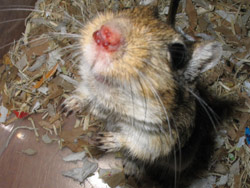 Symptoms:
The gerbil will begin to rub its nose often and a
red liquid will be visible as if it would have fight. You might think that
it's blood, but it's not. This is his nose secretion. Just like us when we are
allergic to something in the air. As it will rub its nose, the gerbil will
lose hair in this area. If the problem isnít solved fast, some crust can be
formed. The gerbil will also sleep more then usual.
Symptoms:
The gerbil will begin to rub its nose often and a
red liquid will be visible as if it would have fight. You might think that
it's blood, but it's not. This is his nose secretion. Just like us when we are
allergic to something in the air. As it will rub its nose, the gerbil will
lose hair in this area. If the problem isnít solved fast, some crust can be
formed. The gerbil will also sleep more then usual.
Cause:
The type of bedding or how clean it is. Cedar,
pine creates a strong Phenol sent that is very damageable to small animal and
even for us in large quantity. Aspen also have s strong sent, even is not
dangerous; some gerbil can be allergic to it as we are sometimes. A good
bedding may also have lots of dust that can produce the same kind of problems.
Also, if the bedding isn't cleaned at least once a month, ammonia can be
produced. High ammonia level can create facial dermatitis, which is caused by
bacteria. Ammonia smells like Windex or hair dying products.
Treatment:
Change the type of bedding. Remove all the old
bedding and try another kind. You can also put your gerbils on toilet paper or
facial tissue, if you want to know if the bedding is really the problem. In
this case, you'll have to change the cage every day. Corncob, in my opinion,
is the best bedding. It is very low in dust, no Phenol or strong sent. You
don't need to put any cream of any kind on its nose, if the problem has been
found, it will cure by itself.
Back
to normal:
When the cause of the allergy will be found and treated, the lost fur will
grow back in its nose and the gerbil will get back to its normal
activities.
Epileptic fits
This can be a traumatising experience for the
owner but it isn't that bad to the gerbil. This characteristic has fast been
observed in the members of the first breeding colonies. The gerbil also been
used in research lab on that topic.
Symptoms:
The gerbil begins to make small convulsions, the
eyes are closed, and the ears closed on the head. It cannot walks or moves
normally. As if it had hiccup.
Causes:
Stress, fear and surprise. it might be a young gerbil who been grab to fast or
for too long.
Treatment:
Just put it back in its tank slowly. Make sure the other gerbils don't make
any trouble. you can also put it in a small box untill it wakes up and then,
put it back with his friends.
Back
to normal:
It will wake up in some minutes. It won't have
any after-effect of this event you don't have to worry.
Crises of tetany
These
crises are much more stressfull for the howner. They can last for some hours
and at some point, we can belive that it will never recover.
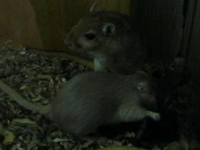 Symptoms:
The gerbil will be partially or totaly paralysed and will have alot of
trouble to move around. The eyes will be closed tight. Click
on the picture for a video.
Symptoms:
The gerbil will be partially or totaly paralysed and will have alot of
trouble to move around. The eyes will be closed tight. Click
on the picture for a video.
Causes:
Maybe the same then the epileptic fits.
Treatment:
There is not much to do beside wait until it ends. Keep it warm and safe
Back
to normal: The next days, it will sleep a lot. Then
everything will come back to normal.
Fight
wound
The gerbil is a small warrior and they get
wounded sometimes. Fights can occur for many reasons but in every case, it's
not normal. Always separate gerbils that fight. If you don't one of them or
both may die.
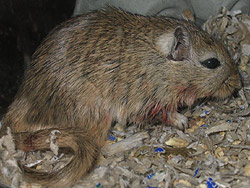 Symptoms:
One or many gerbils will have blood on the fur, mainly on the base of the
tail, the paws or the face. Paws can also be broken.
Symptoms:
One or many gerbils will have blood on the fur, mainly on the base of the
tail, the paws or the face. Paws can also be broken.
Causes:
Read this
Treatment:
Once the involved gerbils insulated, you must leave the time
repair for damages. Sometimes, the wounds can be so serious that the gerbil
won't survive. It's life... The gerbils are very territorial and when a real
fight begins, you can find one of them dead in the tank if you don't get them
on time. Usually, the wounded gerbil will cure very fast. In some days,
you won't see any trace of it. Don't put them back together or the fight will
begin again. Use a split cage technique to see if a reintroduction is
possible.
And
especially, always keep an eye on your gerbils when they are in group. You
never know when they might stop to get along.
Back
to normal: If your gerbil eats, drinks, walks and plays, everything is
going to be fine.
Broken
bones
As every animal, the gerbil can have some bone
broken one day or another. It often occurs in leg and paws.
Symptoms:
The gerbil will walks with difficulty keeping one paw in the air.
Causes:
Falls, fights, wheel with bars.
Treatment:
If you tough about putting on a cast, good luck!
A friend told me she did put a piece of drinking straw on the leg of her
gerbil and then replaced it every 2 days (because de gerbil ate it). But the
best thing to do is wait. By trying to put a homemade cast, you will stress
the animal or even hurt it more then it is already. You might also get bitten.
The wounded bone will repair itself alone. Just make sure the gerbil can go to
its food and water. You don't need to go to the vet, he might only keep it
under observation for some times and tell you to keep it in a safe environment
at home.
Back
to normal: It will continue to eat and make its normal
activities even with a broken paw. In about 2 weeks, everything will be ok. It
already happened to one of mine and it did even run in the wheel with one paw
in the air!
Cysts and tumours
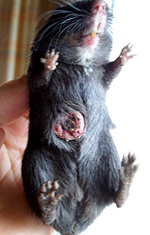 Here is a problem that needs a veterinary. The
cysts can appear everywhere on the gerbil. In old males, it's mainly the
abdominal gland that cause problem.
Here is a problem that needs a veterinary. The
cysts can appear everywhere on the gerbil. In old males, it's mainly the
abdominal gland that cause problem.
Symptoms:
A bump will appear somewhere on your gerbil. This
usually doesnít seem to disturb its routine too much. But in some cases, it
can begin to chew on it or scratch it.
Treatment:
A surgery is the only way to cure it.
Other
picture:
Sensitive person, be careful. This is one of my
friendís gerbil. In its case, it died of old age and not from the tumour.
The gerbil lived with that for about a year.
Picture:
Courtesy of Antioche
Respiratory infection
(Baby's click-click )
This
is an infection met usually in baby gerbils around the age of 3 weeks.
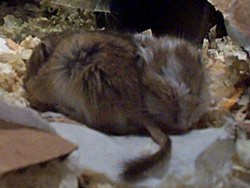 Symptoms:
The babies will remain in a ball shape all the
time and the eyes will be closed. Youíll notice how the fur will be puffy on
the picture. The main characteristic is the strange "click-click"
sound they will do when they breathe. When you take them in your hand, they
would stay motionless whereas at this age, they run like crazy.
Symptoms:
The babies will remain in a ball shape all the
time and the eyes will be closed. Youíll notice how the fur will be puffy on
the picture. The main characteristic is the strange "click-click"
sound they will do when they breathe. When you take them in your hand, they
would stay motionless whereas at this age, they run like crazy.
Causes:
Most
of the time this is caused by pine bedding or too dusty bedding. It may also
be caused by a lack of milk from a sick or old mother what will cause a
weakness in babies, making them more vulnerable to infections.
Treatment:
American website advise to use Ornacycline. An
antibiotic used for treatment of respiratory and intestinal diseases in birds.
But here in Canada, it's only available under prescription and at a high cost.
In the USA you can find this product in any pet shop. Once the infection is
installed, it's almost impossible to save the babies without Ornacycline. They
won't eat or drink and will simply wait to die. You can try to heat them with
a lamp and try to feed them some homemade milk.
The best thing to do is to find what caused the infection and make it so it
won't happen again.
Tail
lost
 We often hear that a gerbil will lose its tail if
you grab it by there. Yes it's true but not totally. The gerbil will not lose
all its tail like a lizard, but only the skin that covers the tail. The bone
and muscles will stay there while you got a piece of tail fur in your hand.
This is not a nice thing to see!
We often hear that a gerbil will lose its tail if
you grab it by there. Yes it's true but not totally. The gerbil will not lose
all its tail like a lizard, but only the skin that covers the tail. The bone
and muscles will stay there while you got a piece of tail fur in your hand.
This is not a nice thing to see!
Causes:
Grabbing the gerbil by the tip of the tail. Always
grab it by the base of the tail, near the body!! In a fight if the
tail is too much wounded, the tail can fall off too.
Treatment:
Place the gerbil in a clean tank. The uncovered
part of the tail will dry and then fall. It won't grow back like lizard. It
might have some balance problems at first but it will get used to it.
Here is a picture of a poor gerbil. She left her
tail hanging around in the cage next to her's. The neighbour niped the tail
and the tip felt off.
Picture:
Courtesy of Amy

